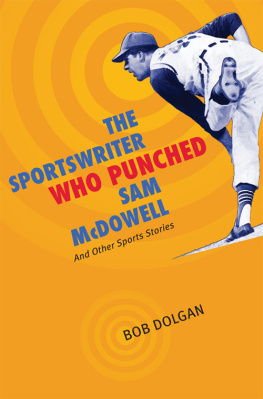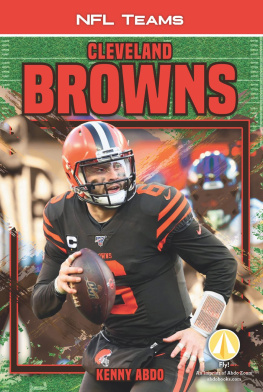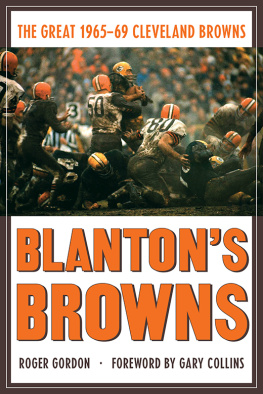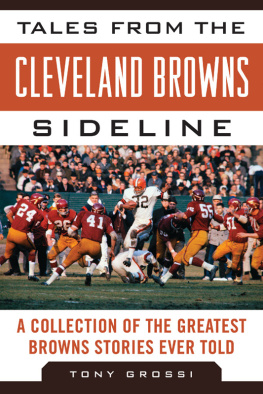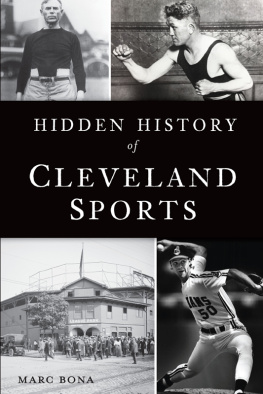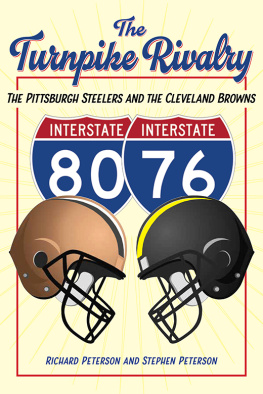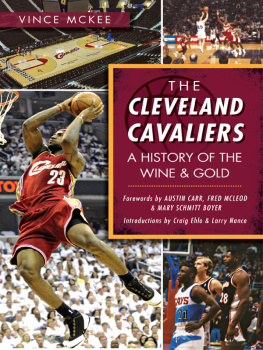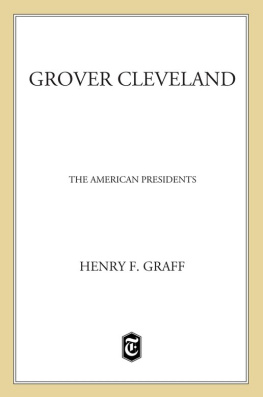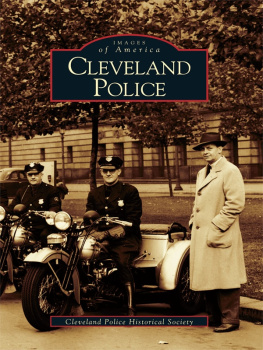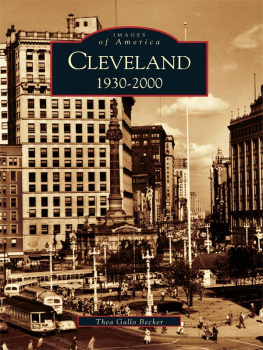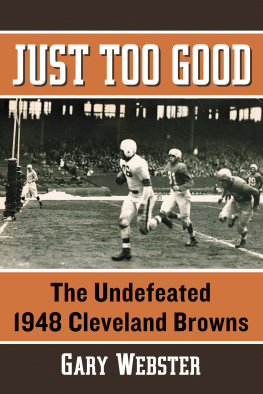Library of Congress Cataloging-in-Publication Data are available at the Library of Congress.
British Library Cataloging-in-Publication data are available.
June 15, 1971
I got a kick out of wily boxing promoter Don Elbaums attempt to put Sam McDowell and Gene Michael, two baseball players, into the ring.
They would be as out of place as Leo Gorcey and Huntz Hall, the Dead End Kids, debating at the United Nations.
McDowell is a wonderful pitcher and probably will be installed in the Baseball Hall of Fame one day, but as a boxer his courage far exceeds his ability.
I know whereof I speak, having taken a split decision over Sudden Sam long ago. It is the only fight I have ever won, and if this column infuriates the pitcher to the point where he demands a rematch Ill hop a plane to Timbuktu. I plan to retire undefeated.
I recount the episode because you never hear of newspapermen punching athletes. Its always the other way around. Cincinnati sage Earl Lawson holds the record, having been belted by both Johnny Temple and Vada Pinson. Braven Dyer of Los Angeles got it from Bo Belinsky, and, to go way back, Bobo Newsom trimmed Robert Ruark, a syndicated writer. There have been other cases.
It is ironic that the gods selected a pushover such as myself to uphold journalistic honor.
It happened in April 1965, in a Cleveland bistro, Downstairs East, which was located in the Park Lane Villa Hotel, near East 105th and Chester Avenue. It was a mecca for the sporting crowd at the time. When I walked in, the proprietor, Gene Pace, told me, Your buddys in the back, shooting pool. He was referring to McDowell.
I was glad to hear it for I hadnt seen Sam in a year and a half, since I parted company with the Plain Dealer and became a publicist at Thistledown racetrack. I thought we would have a nice reunion. I had covered McDowell in his early years with the Indians, and we had been about as friendly as an athlete and sportswriter, two natural enemies, can be. We were big league rookies together. In fact, I had nicknamed him.
That happened on March 13, 1961, when McDowell made his first pitching appearance in a spring training game. He was only 18 and had received a bonus of about $60,000, huge money then, to sign with the Indians. He was the most interesting newcomer in camp. Everyone was intrigued with his potential because of his burning fastball.
As the Plain Dealers new beat writer, I felt I had to commemorate McDowells baptism into big league ball by giving him a nickname. I went into a trance in the pressbox and the words Sudden Sam appeared on my typewriter paper. It stuck. I was thrilled when all the other writers began using it.
Baseball historian Bill James later praised it as one of his favorite sobriquets. The best nickname of the 1960s was Sudden Sam, he wrote. It was very original, sounded good and worked well in print or voice.
That didnt mean anything to Sam on the day of our fight. He must have been harboring some old grudge, for when he entered the bar and saw me he immediately began berating me. He accused me of writing critically of him when I was on the beat. I was shocked and answered back. There were about 20 people in the establishment, listening to our loud voices. Sam and I were about 10 feet apart, separated by a corner of the bar. The last thing on my mind was a fight.
The words kept getting hotter and suddenly there was six feet, five inches of enraged young pitcher bounding toward me with nostrils flaring. He was three inches taller than me and, at 22, ten years younger. I wanted to run but there was nowhere to go. He lunged at me as though he wanted to wrestle me to the floor.
Remembering the way John Wayne did it in the movies, I closed my eyes and threw two right-hand punches, which landed in McDowells face before he ever touched me.
Sudden Sams charge was repelled. He kind of staggered a little, and then there were Pace and a couple of customers frantically holding him at bay. Nobody had to hold me back. McDowell wasnt through. He went back to his seat at the bar and said, Give Bob a drink. He must have been watching the same Western movies I was. Everybody in the place was quiet.
Bob and I know what we have to do, McDowell said. He might have known, but I sure didnt.
Bob, Ill meet you in the parking lot, he said, going out the back door. Exercising my instinct for self-preservation, I went out the front door, got into my car, and drove away. I didnt see him again for a few years. He was friendly. We never talked about our confrontation, except that I once asked him if he minded if I ever wrote about it. He said he did not mind.
There is a postscript to the story. About five years later, after I had returned to the Plain Dealer, I was pinched for a minor traffic violation downtown. The policeman asked for my drivers license. When he looked at it, he asked me if I was the Plain Dealer sportswriter. I confessed I was. Well, you can go this time, he said. But be more careful.
Thanks, officer, I said. Do you read my articles in the paper?
Its not that, he said. I was in the bar the night you had the fight with McDowell.
Publicity-wise promoter Elbaum sent McDowell and Michael contracts in which they were supposed to fight four rounds, with $5,000 going to the winner and $2,000 to the loser. Both ballplayers immediately accepted. Ill fight anybody for $5,000, McDowell said. The players had squared off during a game in May 1971 when McDowell slid hard into shortstop Michael at second base. The fight never came off because the Indians and Yankees refused to let their players participate. McDowell pitched in the major leagues from 1961 to 1973, mostly with the Indians. He led the American League in strikeouts five times and won 20 games in 1970. He was named to the All Star team six times. After he retired, he became an alcohol and drug counselor for several big league clubs. He is not in the Hall of Fame.
I told this story twice in the Plain Dealer, in 1971 and thirty years later, in 2001, to a new generation of readers. The day the 2001 article was published, I received an e-mail from former sportswriter Scott Coconower, which read, I was touched by your story on Sam McDowell. I am one of the many people he has helped. I worked for the Bradenton Herald and St. Petersburg Times before losing everything (wife, career, and home) due to my own alcoholism.
While fading in and out of a blackout one night in 1990, I somehow tracked down Sam after reading a story about him in Sports Illustrated. I told him I desperately needed help or I was going to die. Ill never forget it when he said, Well, pardner, lets see what we can do. He had Leo Cyr of the Major League Baseball Players Association call me the next morning, as I was being evicted from a crummy one-room apartment. They arranged for my treatment at the Keystone Center in Philadelphia. I havent had a drink in more than ten years. I returned to school and have a masters degree in substance abuse counseling. I work as a drug and alcohol interventionist, helping families get a loved one into treatment at Hazelden in Minnesota.

